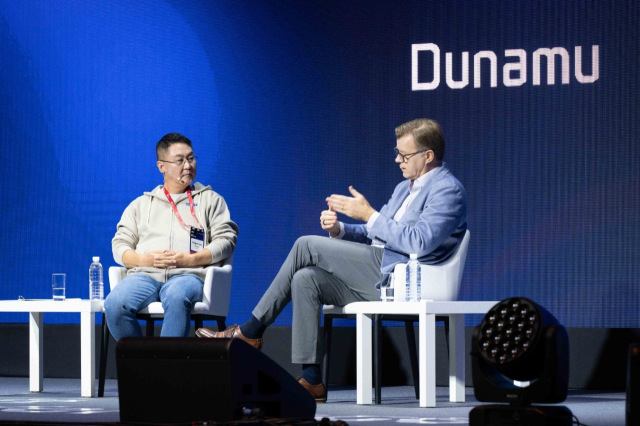
Amid growing global interest in digital assets following the U.S. presidential election, discussions on the future of blockchain have drawn attention. Experts forecast the convergence of blockchain and artificial intelligence (AI).
At the 'Upbit D Conference (UDC)', Korea's representative blockchain conference held at the Shilla Hotel in Jangchung-dong, Seoul on November 14, a keynote conversation was held between Michael Casey, Chairman of the Distributed AI Association (DAIS), a global blockchain pioneer, and Lee Seok-woo, CEO of Upbit operator Dunamu. The conversation between the two experts emphasized the convergence of blockchain and AI as a key alternative to decentralization and data ownership distribution.
Upbit evaluates 2024 as a major milestone for the blockchain and digital asset industry. In Korea, the Virtual Asset Service Providers Act came into effect in July, marking the full-fledged entry into the institutional system, and overseas, spot Bitcoin and Ethereum exchange-traded funds (ETFs) were approved. An Upbit official stressed that "blockchain is now acting as a driving force that leads changes across industries, redefining daily life and business practices, beyond just a technological tool."
◇ Blockchain is an innovation to overcome the trust issue in the central system
In his keynote speech, Casey Chairman shed light on the flow of change in the blockchain industry, based on past experiences.
He said, "The Lehman Brothers crisis, the global financial crisis, and the Mt. Gox incident all revealed the issue of trust in institutions," and "Blockchain technology was an alternative to the declining trust in finance, governance, and systems."
However, he argued that "bubbles can also be a catalyst for innovation." Casey Chairman emphasized that "bubbles give rise to speculation, and the accumulated capital from that tries to innovate."
He particularly said, "The dot-com bubble of the 2000s gave rise to Google and Meta, and open-source code was then provided. This was the beginning of blockchain innovation." Open source has enabled the introduction of Cardano, Solana, and even Layer 2 to the market, and has led to the Non-Fungible Token (NFT) boom. Whenever Bitcoin crashed, funds flowed in, and innovative regulations were introduced globally, he explained.
Casey Chairman emphasized AI as a tool to reduce dependence on central systems. He posed the question, "Will we move towards a future where everyone can freely participate with data sovereignty, or will we succumb to the giant platforms?" and stressed the importance of data sovereignty.
◇ The task for adopting Web3.0 is the convergence of AI and blockchain
CEO Lee asked Casey Chairman about the risks of a highly centralized internet system and the adoption of Web3.0. Casey Chairman said, "While there are issues of data monopoly and privacy with global companies like Meta and Google, users continue to use the services due to convenience, even though they know about it," and "Adoption of Web3.0 is not only about data integrity and privacy, but also about being fun and engaging."
In the discussion on the role of Web3.0 and AI, CEO Lee said, "The user experience (UX) and user interface (UI) of Web3.0 are still complex, but AI agents can become the interface between users and the web."
Regarding how to connect blockchain and AI, Casey Chairman said, "Thinking of blockchain and AI as separate is a Web2.0 mindset," and "Web3.0 is a completely different paradigm, where distributing ownership of computing power is important, and tracking and understanding the vast data processed by AI will become crucial."
- Reporter Maeng Jun-ho
- next@sedaily.com
< Copyright holder ⓒ Decenter, Unauthorized reproduction and redistribution prohibited >








